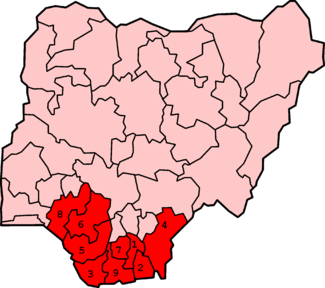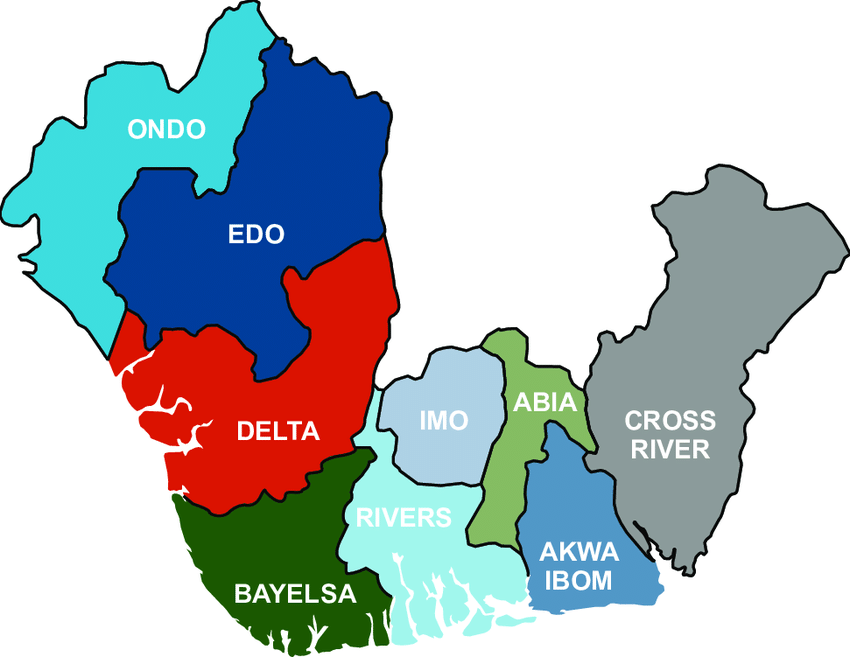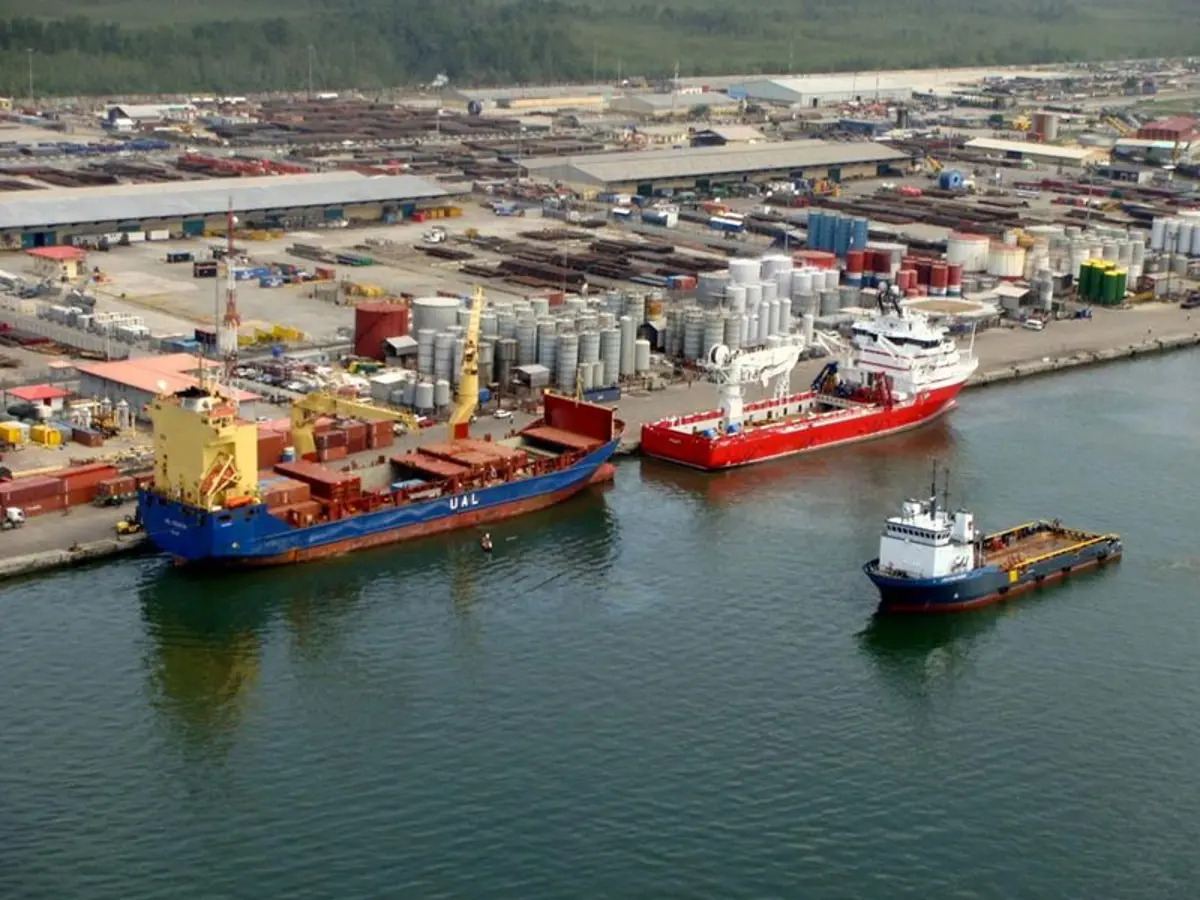Full List of Niger-Delta States in Nigeria
The Niger Delta States in Nigeria are located in the southern part of the country and are known for their rich cultural heritage and natural resources. The region comprises of Bayelsa, Delta, and Rivers States, covering an area of about 70,000 square kilometres. The Niger Delta is home to various ethnic groups, including the Ijaw, Efik, Urhobo, Isoko, and Ogoni, among others.

Map showing all Niger-Delta states in Nigeria
The Niger Delta is one of the most important oil and gas producing regions in Nigeria and Africa. The region is responsible for over 90% of Nigeria’s oil and gas exports, making it a key player in the global energy market. However, despite its immense wealth, the Niger Delta States have been plagued by environmental degradation, poverty, and social unrest for decades. The oil and gas industry has had a significant impact on the region’s environment, leading to oil spills, gas flaring, and deforestation, among other environmental issues. The resulting pollution has affected the health and livelihoods of the people living in the Niger Delta, leading to social unrest and conflict.
Despite its wealth, the Niger Delta region is also one of the most underdeveloped and impoverished regions in Nigeria. Oil spills, gas flaring, and other environmental degradation have caused widespread damage to the region’s ecosystems and livelihoods. Conflict and instability have also plagued the region for decades. Despite these challenges, the Niger Delta region is a vibrant and resilient place. Its people are known for their rich culture, traditions, and hospitality. The region is also home to a number of important economic and development initiatives.
This blog post will provide a full list of the Niger Delta states in Nigeria, along with a brief description of each state. It will also discuss the importance of the Niger Delta region to Nigeria and the need for sustainable development and environmental protection in the region.
Geographical Overview of Niger-Delta
The Niger Delta region is located in southern Nigeria, covering approximately 70,000 km² and constituting about 7.5% of Nigeria’s landmass. The region is made up of present-day Bayelsa, Delta, and Rivers States. The Niger Delta is a low-lying region through which the waters of the Niger River drain into the Gulf of Guinea.
The region is characterized by a network of creeks, swamps, and rivers, which are essential to the ecosystem and the livelihood of the people living in the region. The Niger Delta is also known for its rich biodiversity, with over 10,000 species of plants, 300 species of birds, and numerous species of fish and other aquatic life.
The Niger Delta region is home to approximately 32 million people, which is about 20% of Nigeria’s overall population. The region is made up of nine oil-producing states, including Abia, Akwa Ibom, Bayelsa, Cross River, Delta, Edo, Imo, Ondo, and Rivers.
The Niger Delta is an important economic hub, with oil and gas production being the mainstay of the economy. The region accounts for over 90% of Nigeria’s oil and gas production and generates a significant portion of the country’s revenue. The oil and gas industry has, however, had a significant impact on the environment and the people living in the region, leading to conflicts and social unrest.
In terms of transportation, the Niger Delta is well-connected by waterways, with numerous ports and jetties serving the region. The region is also served by several airports, including the Port Harcourt International Airport, the Asaba International Airport, and the Warri Airport.
Overall, the Niger Delta region is a unique and important part of Nigeria, with its rich natural resources and diverse culture. The region faces numerous challenges, including environmental degradation, social unrest, and economic inequality, but it also has immense potential for growth and development.
LIST OF NIGER-DELTA STATES IN NIGERIA
The Niger Delta Region is made up of several states in Nigeria. Initially, the region was made up of only three states: Bayelsa, Delta, and Rivers. However, in the year 2000, the Nigerian Federal Government added seven more states to the region. These states include Abia, Akwa Ibom, Cross River, Edo, Imo, Ondo and Rivers state respectively.
Each of these states has its own capital and several major cities. Some of the major cities in the Niger Delta Region include Port Harcourt in Rivers State, Warri in Delta State, and Uyo in Akwa Ibom State.
The table below provides a summary of the states in the Niger Delta Region, their capitals, and some of their major cities.
| State | Capital | Major Cities |
|---|---|---|
| Abia | Umuahia | Aba, Ohafia, Arochukwu |
| Akwa Ibom | Uyo | Eket, Ikot Ekpene, Oron |
| Bayelsa | Yenagoa | Brass, Nembe, Sagbama |
| Cross River | Calabar | Akpabuyo, Odukpani, Obubra |
| Delta | Asaba | Warri, Sapele, Agbor |
| Edo | Benin City | Auchi, Ekpoma, Irrua |
| Imo | Owerri | Orlu, Okigwe, Mbaise |
| Ondo | Akure | Owo, Akoko, Ondo City |
| Rivers | Port Harcourt | Port Harcourt, Bonny Island, Oyigbo |
Brief description of each state:
- Abia: Abia State is located in southeastern Nigeria. It is a major agricultural state, producing crops such as cassava, yam, and rice. The state is also home to a number of important industries, including oil and gas, manufacturing, and tourism.
- Akwa Ibom: Akwa Ibom State is located in southeastern Nigeria. It is one of the most oil-rich states in the Niger Delta region. The state is also home to a number of important industries, including agriculture, fishing, and tourism.
- Bayelsa: Bayelsa State is located in southern Nigeria. It is the smallest state in the Niger Delta region, but it is also one of the most oil-rich states. The state is home to a number of important industries, including oil and gas, fishing, and agriculture.
- Cross River: Cross River State is located in southeastern Nigeria. It is a major agricultural state, producing crops such as cocoa, rubber, and palm oil. The state is also home to a number of important industries, including tourism and manufacturing.
- Delta: Delta State is located in southern Nigeria. It is one of the most oil-rich states in the Niger Delta region. The state is home to a number of important industries, including oil and gas, agriculture, and fishing.
- Edo: Edo State is located in southern Nigeria. It is a major agricultural state, producing crops such as rubber, palm oil, and yam. The state is also home to a number of important industries, including manufacturing, oil and gas, and tourism.
- Imo: Imo State is located in southeastern Nigeria. It is a major agricultural state, producing crops such as cassava, yam, and rice. The state is also home to a number of important industries, including oil and gas, manufacturing, and tourism.
- Ondo: Ondo State is located in southwestern Nigeria. It is a major agricultural state, producing crops such as cocoa, rubber, and palm oil. The state is also home to a number of important industries, including oil and gas, manufacturing, and tourism.
- Rivers: Rivers State is located in southern Nigeria. It is one of the most oil-rich states in the Niger Delta region. The state is home to a number of important industries, including oil and gas, agriculture, and fishing.
Map of the Niger Delta region, highlighting the different states:

It is important to note that the Niger Delta Region is known for its rich oil deposits, and as such, oil production is a major economic activity in the region. However, the region has also faced several environmental and social challenges as a result of oil exploration and production.
ECONOMIC SIGNIFICANCE
The Niger Delta region is a significant contributor to Nigeria’s economy. The region is rich in oil and gas reserves, which account for over 90% of Nigeria’s total exports and more than 80% of its GDP. The oil and gas industry has been the mainstay of the region’s economy for decades, and it has attracted significant investments from both local and foreign investors.
Apart from oil and gas, the Niger Delta region is also endowed with vast agricultural resources, including fertile land and abundant water resources. The region is a major producer of crops such as cassava, yam, rice, and maize, which are important staples in Nigeria’s food basket. The region’s fishing industry is also a significant contributor to the economy, providing employment opportunities for thousands of people.
Tourism is another potential source of revenue for the Niger Delta region. The region is home to several natural attractions, including beaches, mangrove swamps, and wildlife reserves. However, the region’s tourism industry is yet to reach its full potential due to a lack of infrastructure and security concerns.
Despite its economic significance, the Niger Delta region is plagued by several challenges that have hindered its development. These challenges include environmental degradation, insecurity, and poor infrastructure. The region’s oil and gas industry has been blamed for the environmental degradation, which has led to the loss of biodiversity and livelihoods for many communities in the region.
ENVIRONMENTAL CHALLENGES
The Niger Delta region is home to Nigeria’s oil and gas industry, but it is also plagued with environmental challenges that threaten the health and livelihoods of its residents. The region’s ecosystem has been severely degraded due to oil spills, gas flaring, dredging of larger rivers, and reclamation of land for oil and gas extraction. The environmental degradation from these activities costs about US$758 million every year.
The lack of sustainable development policies and environmental protection measures has led to devastating consequences for the region. The destruction of the ecosystem has caused environmental problems like flooding and soil erosion, which destroy homes and crops, leading to further poverty. The health risks from environmental degradation in the Niger Delta are significant, with over 37 million inhabitants living in the region. The oil industry is hosted in over 1500 communities in the region, which are largely rural.
To address these environmental challenges, sustainable policies need to be put in place to protect the region’s ecosystem and the health of its residents. The government needs to enforce environmental regulations and hold oil companies accountable for their actions. Efforts should be made to clean up oil spills and prevent future spills from occurring. Additionally, there needs to be a shift towards renewable energy sources to reduce reliance on fossil fuels and mitigate the environmental impact of the oil and gas industry.
PEACEBUILDING AND DEVELOPMENT
The Niger Delta region of Nigeria has been plagued by conflict for decades. The conflict stems from a variety of factors, including resource control, environmental degradation, and political marginalisation. The situation has been exacerbated by the activities of armed groups, who have engaged in acts of violence and sabotage against oil installations and other targets.
Peacebuilding efforts in the Niger Delta have focused on addressing the root causes of the conflict, as well as disarming and reintegrating former combatants. The Presidential Amnesty Programme (PAP), introduced by the Federal Government of Nigeria in 2009, has been a key component of these efforts. The programme has provided training, education, and other forms of support to former combatants, with the aim of reintegrating them into society and promoting peace.
In addition to the PAP, a number of other initiatives have been launched to promote peace and development in the Niger Delta. The Niger Delta Partnership Initiative (NDPI) has been working to bring together communities, businesses, and civil society organisations to effectively detect, assess, and address conflicts. With nearly 5,000 peace actors and active chapters in all nine states, P4P is responsible for regional monitoring and mitigation.
Despite these efforts, the Niger Delta region continues to face significant challenges in terms of development. The region is home to some of the poorest communities in Nigeria, with high levels of unemployment, poverty, and underdevelopment. Addressing these challenges will require sustained investment in infrastructure, education, and other forms of development, as well as continued efforts to promote peace and stability in the region.
CONCLUSION
The Niger Delta region is a vital part of Nigeria’s economy and society. It is home to the country’s oil and gas industry, which accounts for over 70% of Nigeria’s foreign exchange earnings. The region is also home to a number of other important industries, including agriculture, fishing, and tourism.
However, the Niger Delta region is also one of the most underdeveloped and impoverished regions in Nigeria. Oil spills, gas flaring, and other environmental degradation have caused widespread damage to the region’s ecosystems and livelihoods. Conflict and instability have also plagued the region for decades.
There is a need for sustainable development and environmental protection in the Niger Delta region. The government and other stakeholders must work together to address the challenges facing the region and ensure that its people benefit from its resources.
FREQUENTLY ASKED QUESTIONS
- WHAT ARE THE STATES THAT MAKE UP THE NIGER DELTA REGION IN NIGERIA?
The Niger Delta region is made up of nine states in Nigeria, which are Bayelsa, Delta, Rivers, Akwa Ibom, Cross River, Edo, Imo, Abia, Rivers and Ondo. These states are located in the southern part of Nigeria and are known for their vast oil reserves.
- WHAT IS THE HISTORY OF THE NIGER DELTA REGION BEFORE COLONIALISM?
Before the arrival of the Europeans, the Niger Delta region was home to various ethnic groups such as the Ijaw, Itsekiri, Urhobo, Isoko, Ogoni, and many others. These groups had their own unique cultures and traditions, which were heavily influenced by the region’s geography and climate.
- WHAT ARE SOME FACTS ABOUT DELTA STATE IN THE NIGER DELTA REGION?
Delta State is one of the states in the Niger Delta region of Nigeria. It was created on August 27, 1991, from the former Bendel State. The state has a population of over 4 million people and is known for its diverse ethnic groups, including the Urhobo, Isoko, Itsekiri, and Ijaw.
- WHAT IS THE SIGNIFICANCE OF THE NIGER DELTA REGION IN NIGERIA?
The Niger Delta region is significant to Nigeria because it is home to the country’s vast oil reserves. The region accounts for over 90% of Nigeria’s oil production and is a major source of revenue for the country.
- WHAT ARE SOME OF THE MAJOR ETHNIC GROUPS IN THE NIGER DELTA REGION?
The Niger Delta region is home to various ethnic groups, including the Ijaw, Itsekiri, Urhobo, Isoko, Ogoni, and many others. These groups have their own unique cultures and traditions, which have been influenced by the region’s geography and climate.
- WHAT IS THE IMPACT OF NIGER DELTA MILITANTS ON THE REGION AND NIGERIA AS A WHOLE?
The Niger Delta militants have had a significant impact on the region and Nigeria as a whole. The militants have been responsible for attacks on oil installations, which have led to a decline in oil production and revenue for the country. The government has been working to address the concerns of the militants and improve the socio-economic conditions of the region.
